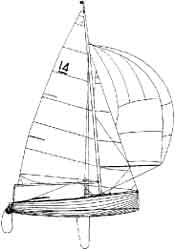Displaying items by tag: IDRA 14 Class Association
IDRA 14 Class Association
 First raced in 1946 and now fitted with a trapeze and spinnaker, the two-person IDRA 14 remains one of the most popular adult dinghy classes in Dublin Bay. ISA affiliated
First raced in 1946 and now fitted with a trapeze and spinnaker, the two-person IDRA 14 remains one of the most popular adult dinghy classes in Dublin Bay. ISA affiliated
# LOA: 14Ft
# SA: 110 SQ. FT
# Spinnaker: 140 SQ FT
# Hull Wt: 325lbs (min)
Afloat's Graham Smith wrote about the IDRA 14 in March 2009: "The same clubs in three locations also actively promote the classic clinker-built IDRA14 and 34 boats continue to enjoy their racing at club and open meeting level. Two boats, built in 1947 and 1950 respectively, rejoined the class in 2008 after remarkable restoration work by their owners.
Despite being a Dublin-based class, it does like to travel and last year saw a dozen boats head to Carlingford for the Northerns where Pat O’Neill and Rick Morris of Clontarf took the title.
Almost twice that number – 65% of the national fleet – were attracted to Sligo for the National Championships where Sutton’s Alan Carr and Aoibhin de Burca took the honours in the Gold Fleet and clubmates Gordon Kelly and Mark Masterson headed the Silver Fleet.
Carr and de Burca also won the October Series and Gerry O’Hanlon and Paul McNally sailed their beautifully re-built Charmain to victory in the IDRA Open at Clontarf. The IDRAs’ sister class in the UK, the Dragonflies, celebrates its 60th anniversary next year and a contingent of the 14s will travel to Suffolk to help mark the occasion. National Champions (2009): Alan Carr and Aobhin de Burca, Sutton DC."
IDRA 14 Class Association, IDRA 14 Class Commodore, c/o 126 Ballinteer Close, Dublin 16. Tel: 086 155 8632, email: [email protected]
or
Jennifer Byrne, Secretary, 2 Spencer Villas, Glenageary, Co Dublin. Tel: 01 2802131, email: [email protected]
There is a space for Irish boating clubs and racing classes to use as their own bulletin board and forum for announcements and discussion. If you want to see a dedicated forum slot for your club or class, click here





























































